|
|
|
Sort Order |
|
|
|
Items / Page
|
|
|
|
|
|
|
| Srl | Item |
| 1 |
ID:
118311
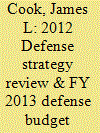

|
|
|
|
|
| Publication |
2013.
|
| Summary/Abstract |
Regardless of whether one is a supporter or a critic, some additional analysis regarding the formulation of the new defense strategic guidance is useful to better understand the rationale for changing defense priorities, the magnitude and impact of these changes within the Department of Defense (DOD), and the review process itself. Specifically, three questions warrant further examination: 1) Why was a DoD-level defense strategy review necessary, given the 2010 Quadrennial Review? 2) What are the implications of this new strategic guidance for the DoD? 3) What are the strategic risks? These questions are addressed by assessing the defense strategic guidance through the lens of strategy and its components: ends, ways, means and risk.
The United States of America is the greatest force for freedom and security that the world has ever known. And in no small measure, that's because we've built the best-trained, best-led, best-equipped military in history - and as Commander-in-Chief, I'm going to keep it that way.
|
|
|
|
|
|
|
|
|
|
|
|
|
|
|
|
| 2 |
ID:
091282
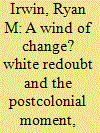

|
|
|
|
|
| Publication |
2009.
|
| Summary/Abstract |
In July 1963, U.S. Secretary of State Dean Rusk held a private meeting with Dr. Willem Naude, the ambassador from South Africa. "A rough time [is] ahead," Rusk explained as the representative sat down in his office. "We are under enormous pressure but do not intend to give in." Several members of the so-called African bloc at the United Nations had successfully protested the practice of apartheid-South Africa's system of institutionalized racial discrimination-in the Security Council that year, and pressure was rapidly mounting in the General Assembly for mandatory economic sanctions against South Africa. The ambassador looked across Rusk's desk and noted that it was "ironical" that ten years earlier they had been allies in the Cold War, and now his country was being isolated in its struggle against a "common enemy." He went on to assert, "The United States [is] to a large degree responsible for releasing these revolutionary forces in the world. The goal of a great power should be to play down tensions and try to get people to talk together, but the United States without even opening its mouth [has] released dangerous forces in the world." Rusk paused for a moment before responding, "[I wonder] if these forces [are] not deeply rooted in the nature of man. [I wonder] if this discourse has not been going on for 2,000 years. Did not man, like most animals, not like to be pushed around too much?"
|
|
|
|
|
|
|
|
|
|
|
|
|
|
|
|
| 3 |
ID:
183670
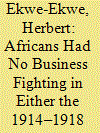

|
|
|
|
|
| Summary/Abstract |
The wars of 1914–1918 and 1939–1945 are without parallel in the expansive stretch of decades of the pan-European conquest and occupation of Africa in creating such profound opportunity to study the very entrenched desire by the European conqueror-states in Africa to perpetuate their control on the continent and its peoples indefinitely. The two principal protagonists in each conflict, Britain and Germany, were the lead powers of these conqueror-states that had formally occupied Africa since 1885. Against this cataclysmic background of history, Africans found themselves conscripted by both sides of the confrontation line in 1914–1918 to at once fight wars for and against their aggressors during which 1 million Africans were killed. Clearly, this was a case of double-jeopardy of conquered and occupied peoples fighting for their enemy-occupiers. In the follow-up 1939–1945 war, when Germany indeed no longer occupied any African land (having been defeated in the 1914–1918 encounter), Britain and allies France and Belgium (all continuing occupying powers in Africa) conscripted Africans, yet again, to fight for these powers in their new confrontation against Germany, and Japan, a country that was in no way an aggressor force in Africa. Hundreds of thousands of Africans were killed in this second war. In neither of these conflicts, as this study demonstrates, do the leaders of these warring countries who occupied (or hitherto occupied) Africa ever view their enforced presence in Africa as precisely the scenario or outcome they wished their own homeland was not subjected to by their enemies. On the contrary, just as it was their position in the aftermath of the 1914–1918 war, Britain, France, Belgium, Spain and Portugal in 1945 each envisaged the continuing occupation of the states and peoples of Africa they had seized by force prior to these conflicts. Winston Churchill, the British prime minster at the time, was adamant: ‘I had not become the king’s first minister in order to preside over the liquidation of the British Empire’. Charles de Gaulle, leader of the anti-German ‘free French forces’, was no less categorical on this score: ‘Self-government [in French-occupied Africa, Asia, the Caribbean, South America, the Pacific and elsewhere in the world] must be rejected – even in the more distant future’.
|
|
|
|
|
|
|
|
|
|
|
|
|
|
|
|
| 4 |
ID:
148861
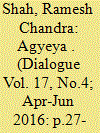

|
|
|
|
|
| Summary/Abstract |
Sachchidananda Hirananda Vatsyayan “Agyeya” was born in
Kushinagar (UP) which his archaeologist father was excavating. He
came to be known as ‘Agyeya,’ because his early writings, smuggled
out of prison, were published under conditions in which the author’s
name could not be revealed. During his postgraduate studies in Lahore,
he was arrested for revolutionary activities and spent several years in
prison
|
|
|
|
|
|
|
|
|
|
|
|
|
|
|
|
| 5 |
ID:
171276
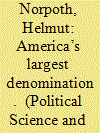

|
|
|
|
|
| Summary/Abstract |
By a measure of religious affiliation used by Gallup polls for nearly a century, the denomination with the largest following in the United States has always turned out to be “None,” ahead of Catholic, Methodist, Baptist, or any other faith. The existence of such a large flock without religious affiliation might be expected for a country with a Constitution guaranteeing freedom of and from religion. The secular portion of the American electorate has always been big enough to wield, potentially at least, political clout. Its partisan attachments have consistently favored the Democratic over the Republican side. What is limiting the electoral clout of the “Nones” today is that nearly half of them profess no partisan affiliation. They are Independents in matters of both church and state.
|
|
|
|
|
|
|
|
|
|
|
|
|
|
|
|
| 6 |
ID:
101848
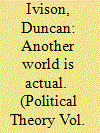

|
|
|
|
|
| Publication |
2011.
|
| Summary/Abstract |
There have been two distinctive aspects to James Tully's approach to the study
of imperialism over the years, and both are put to work in these remarkable
volumes.
1
The first is his belief in two seemingly contradictory claims: (i) that
imperialism is much more pervasive than usually thought (conceptually, historically and practically); and yet (ii) that there are many more forms of resistance to it than usually appreciated. The second is the way Tully places the
situation of indigenous peoples at the heart of his analysis. This goes back to
his groundbreaking work on Locke, and his extraordinary re-interpretation of
Locke's work in the context of early modern discourses of imperialism. But the
situation of indigenous peoples also deeply informed his argument in Strange
Multiplicity
2
-and not only in terms of the central motif of the lectures provided by Haida artist Bill Reid. In that book, he sought to reveal and defend a
much richer conception of legal and cultural pluralism than had hitherto been
appreciated by liberal constitutionalists and their critics. Indigenous peoples
are not simply a litmus test for our thinking about pluralism but represent a
much deeper challenge to the way we conceptualize notions of citizenship,
sovereignty, democracy and freedom in the first place-and indeed the nature
of political philosophy itsel.
|
|
|
|
|
|
|
|
|
|
|
|
|
|
|
|
| 7 |
ID:
134308


|
|
|
|
|
| Summary/Abstract |
The student-led anti–media-monopoly movement in Taiwan has generated strong momentum since mid-2012. In early 2013, the National Communications Commission responded by drafting the “Prevention of Broadcasting and Television Monopoly and the Maintenance of Diversity Act”, which was approved by the Executive Yuan in April 2013 and is now waiting to be debated in the Legislative Yuan. In contemporary Taiwan, the social is often connected with the political. The existing democratic system, which is a legacy of the democratisation process in the twentieth century, no longer seems adequate to serve the citizens of the twenty-first century. This paper considers the anti-media-monopoly movement and the burgeoning civic movements in recent years as part of a “second wave” of democratisation for further political reform and democratic consolidation. When martial law was lifted in Taiwan in 1987, the “first wave” of media liberalisation ended with the commercialisation of industry. The “second wave” of media democratisation has picked up where the first wave left off and may finally establish, through increasingly more thoughtful media policies, a better and fairer media environment that is more suitable for democratic Taiwan.
|
|
|
|
|
|
|
|
|
|
|
|
|
|
|
|
| 8 |
ID:
121256
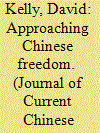

|
|
|
|
|
| Publication |
2013.
|
| Summary/Abstract |
The rise of stability preservation to dominance in the political
order coincided with a highly charged debate over "universal values" and
a closely related discussion of a "China Model". This paper analyses the
critique of universal values as a "wedge issue" that is used to pre-empt
criticism of the party-state by appealing to nationalism and cultural essentialism. Taking freedom as a case in point of a universal value, it
shows that, while more developed in the West, freedom has an authentic
Chinese history with key watersheds in the late Qing reception of popular sovereignty and the ending of the Maoist era. The work of Wang
Ruoshui, Qin Hui and Xu Jilin display some of the resources liberals
now bring to "de-wedging" universal values, not least freedom. They
share a refusal to regard "Western" values as essentially hostile to Chinese.
|
|
|
|
|
|
|
|
|
|
|
|
|
|
|
|
| 9 |
ID:
118277


|
|
|
|
|
| Publication |
2013.
|
| Summary/Abstract |
[D]emocracy is at risk of losing its meaning and purpose in the hands of presidents who, while freely elected, crush freedom once in office.
|
|
|
|
|
|
|
|
|
|
|
|
|
|
|
|
| 10 |
ID:
116433
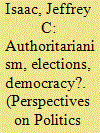

|
|
|
|
|
| Publication |
2012.
|
| Summary/Abstract |
The demand for democracy is a pervasive feature of contemporary political discourse. It is a compelling demand, for citizens and elites who rally beneath the banner of "democracy" and for political scientists who study the ways citizens and elites rally beneath banners in order to mobilize, seek, and contest political power. The force of this demand was captured by the cover of our June 2011 issue, which featured a wall in Egypt's Tahrir Square covered with graffiti stating that "Mubarak must go" and calling for "freedom" and "democracy."
|
|
|
|
|
|
|
|
|
|
|
|
|
|
|
|
| 11 |
ID:
101841


|
|
|
|
|
| Publication |
2011.
|
| Summary/Abstract |
This essay argues that many modern discussions of Locke's political theory are unconsciously shaped by an imaginative picture of the world inherited from the past, on which authority and freedom are fundamentally antipathetic. The consequences of this picture may be seen in the distinction made customarily in Locke studies between the 'authoritarian' Locke of Two Tracts on Government, for whom authority descends from God, and the later, 'liberal,' Locke, for whom authority arises from the will and agreement of individuals, and felt in the emphases placed on consent and resistance in most interpretations of Lockean political thought. The essay examines the composition and contours of this picture and, by holding up a mirror to contemporary Locke scholarship, draws attention to some of the ways in which it unwittingly distorts Locke's thinking.
|
|
|
|
|
|
|
|
|
|
|
|
|
|
|
|
| 12 |
ID:
144825
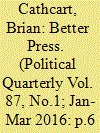

|
|
|
|
|
| Summary/Abstract |
Writing recently in The Political Quarterly, the journalist John Lloyd took issue with regulatory remedies for ‘bad journalism’ in the United Kingdom that were proposed by the Leveson inquiry of 2011–12 and endorsed by Parliament in 2013 in the form of a Royal Charter. State action will fail, he asserted, because only journalists can change journalism, and he urged British journalists to undertake this transformation. This response argues that Lloyd dismisses the Leveson process too lightly and takes too little account of the many victims of press abuses, who are entitled to better protection. A decent society had to do something about this, and the Leveson Charter process was a measured and constructive response that offers the best hope of higher press standards and of protection for ordinary citizens while safeguarding freedom of expression for journalists. Lloyd's proposal for action by journalists, by contrast, is impractical, not least because it ignores powerful forces preventing journalists from taking control.
|
|
|
|
|
|
|
|
|
|
|
|
|
|
|
|
| 13 |
ID:
090826
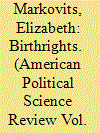

|
|
|
|
|
| Publication |
2009.
|
| Summary/Abstract |
Through an examination of Aeschylus' Oresteia, this essay argues for the critical importance of intergenerational justice to democratic theory. It explores the difficulties of democratic responsibility given the tension between necessity and freedom central to questions of intergenerational justice. The essay first details the relevant lacunae in the theories of two major figures of contemporary democratic theory, John Rawls and Jürgen Habermas. It then develops an account of democratic responsibility that acknowledges human freedom to make decisions, even given the necessity created by the fact that individuals and communities inherit their own range of potential actions from previous generations. The essay elaborates this claim by examining how each of the central figures in the Oresteia deals first with the dilemmas inherited from the past and then with new situations engendered by his or her own actions. The essay concludes with a consideration of this aspect of democracy in contemporary political life
|
|
|
|
|
|
|
|
|
|
|
|
|
|
|
|
| 14 |
ID:
065977
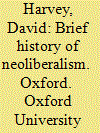

|
|
|
|
|
| Publication |
Oxford, Oxford University Press, 2005.
|
| Description |
vii, 247p.
|
| Standard Number |
0199283265
|
|
|
|
|
|
|
|
|
|
|
|
Copies: C:1/I:0,R:0,Q:0
Circulation
| Accession# | | | | | | | | | | | |
| 050188 | 330.122/HAR 050188 | Main | On Shelf | General | | | | | | | |
|
|
|
|
| 15 |
ID:
185947
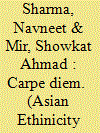

|
|
|
|
|
| Summary/Abstract |
The Kashmir has an intriguing political and social landscape. The idea of Kashmir is nonetheless guided by multiple narratives created by different stakeholders in Kashmir. The Kashmir falls under the control of three nuclear powers, namely India, Pakistan and China. The accession of an erstwhile princely state of Kashmir to India had different conflicts in store, with the result of which South Asian nuclear-armed neighbours fought three wars to claim the Kashmir territory, besides coming close to a nuclear blaze. The argumentation about the Kashmir among different stakeholders in Kashmir poses the threat to peace in South Asia. We look at different perspectives of various stakeholders. In this paper, we attempt to emphasize that why none of the stakeholders wants a resolution for Kashmir conflict and why all of them want Kashmir, if not to burn but it must simmer continuously.
|
|
|
|
|
|
|
|
|
|
|
|
|
|
|
|
| 16 |
ID:
158083
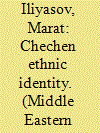

|
|
|
|
|
| Summary/Abstract |
This article critically assesses the ostensible transformation in Chechen ethnic identity. Journalists and scholars who came to this conclusion based their claim on obvious changes in Chechen behavior. The brave and irreconcilable resistance the nation demonstrated during the First and the Second Russo-Chechen Wars of 1994–1996 and 1999–2009, respectively, was replaced by a submissive and loyal stance with regard to the new authorities and recent enemies. This article investigates whether such a change in behavior reflects a corresponding change in ethnic identity. This article asserts that ‘non-Chechen’ behavioral models do not signify changes in Chechen ethnic identity by presenting and analyzing Chechen narratives concerning the question. In summary, this article concludes that the ethnic identity of the nation remained mainly untouched. This conclusion is supported by the observed continuity of Chechen resistance, which has always been driven by cherished values such as freedom.
|
|
|
|
|
|
|
|
|
|
|
|
|
|
|
|
| 17 |
ID:
106675


|
|
|
|
|
| Publication |
2011.
|
| Summary/Abstract |
The amazing scenes that were beamed from Cairo's Tahrir Square in January and February 2011 conveyed an important revelation about the ingenuity and resourcefulness of the human spirit. In particular, they highlighted the miraculous power of joint public action not only to carve out spaces for freedom, but to forge a new shared identity which is indispensable for the establishment of a durable democratic order. No less significant, however, is that revolutionary action by pro-democracy insurgents has provided concrete answers to many puzzles that had exercised democracy theorists and Middle East experts for decades. By showing how such action can overcome the divisions and obstacles theorists have seen as an impediment to democratisation, the preoccupation with 'prerequisites' for democracy has been revealed as a diversion. From the American Revolution to Tahrir Square, pro-democracy revolutionary action has the power not just to overthrow tyranny, but also to refashion the nation, starting with the revolutionaries themselves. It can also 'overthrow' theory.
|
|
|
|
|
|
|
|
|
|
|
|
|
|
|
|
| 18 |
ID:
120873


|
|
|
|
|
| Publication |
2013.
|
| Summary/Abstract |
The human security agenda, as currently operationalized by the majority of powerful states and institutions, exhibits a distinct liberal character, simultaneously contributing to and legitimizing the dominant liberal peacebuilding approach. As such, there has been a crowding out of alternative conceptions of human security, including those which focus on emancipation. This latter approach to human security offers a more transformative vision through its focus on issues such as hegemony, power, and freedom. Paths to such forms of human security have yet to materialize, largely due to the characteristics of a liberal-internationalist approach which has narrowed the political space in which challenges to the status quo can be imagined and realized. In its failure to allow for a genuine plurality of voices and in its insistence on creating false consensus, liberal peacebuilding blocks the emancipatory promise of a genuine shift from state to human security. A potential starting point for imagining alternatives to liberal peacebuilding and thus the creation of emancipatory forms of human security is to consider the role and possibilities for agonistic modes of politics and peacebuilding. Transforming inevitable differences that are part of human society into agonistic relationships-where differences exist and are negotiated among adversaries (as opposed to enemies)-opens up the political space required to challenge dominant liberal approaches to human security and enables a shift toward the emancipatory model.
|
|
|
|
|
|
|
|
|
|
|
|
|
|
|
|
| 19 |
ID:
130992
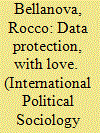

|
|
|
|
|
| Publication |
2014.
|
| Summary/Abstract |
How to Engage with the Politics of Privacy in the Age of Preemptive Security? My suggestion is to start with data protection, which, following De Hert and Gutwirth (2006), is not exactly the same of privacy. Extrapolating from their analysis of the two as different "legal tools," I would say that privacy and data protection are two slightly different rationales of power relations: one of privacy based on the "opacity of the individual" and one of data protection on the "transparency and accountability of the powerful" (Gutwirth and De Hert 2008:275; emphasis in original).1 These rationales (attempt to) orientate two different loose dispositifs, each formed by a composite ensemble of elements. Some of these elements are peculiar to each dispositif, while others are shared or encompassed by both
|
|
|
|
|
|
|
|
|
|
|
|
|
|
|
|
| 20 |
ID:
186850


|
|
|
|
|
| Summary/Abstract |
Departing from the prevailing, individualist perspective of freedom, emphasizing individuals’ independence and the maximization of self-interest via unconstrained decision-making, this article applies the concepts of practised freedom and relational autonomy to explore the lived experience of Chinese rural-to-urban migrant gay men. Drawing on our ethnographic fieldwork in the ‘urban villages’ (城中村) of South China, we examine the ways in which rural migrant gay men achieve a sense of freedom, which is dependent on rural-to-urban migration, informal manufacturing jobs, and other queer peers, thus demonstrating a certain level of relational autonomy. Our article clearly shows how these men have come to identify as homeless guabi (挂逼, local slang for those who suffer a tragic and mysterious fate) and spend their days wandering, with no interest in stable work or long-term monogamous relationships. Our research offers a first-hand anthropological account of young adults from the rural working classes who prefer to ‘lie flat’ (躺平) – they refuse to strive for upward social mobility because they believe that upward social mobility is unattainable and a factory job too taxing.
|
|
|
|
|
|
|
|
|
|
|
|
|
|
|
|
|
|
|
|
|